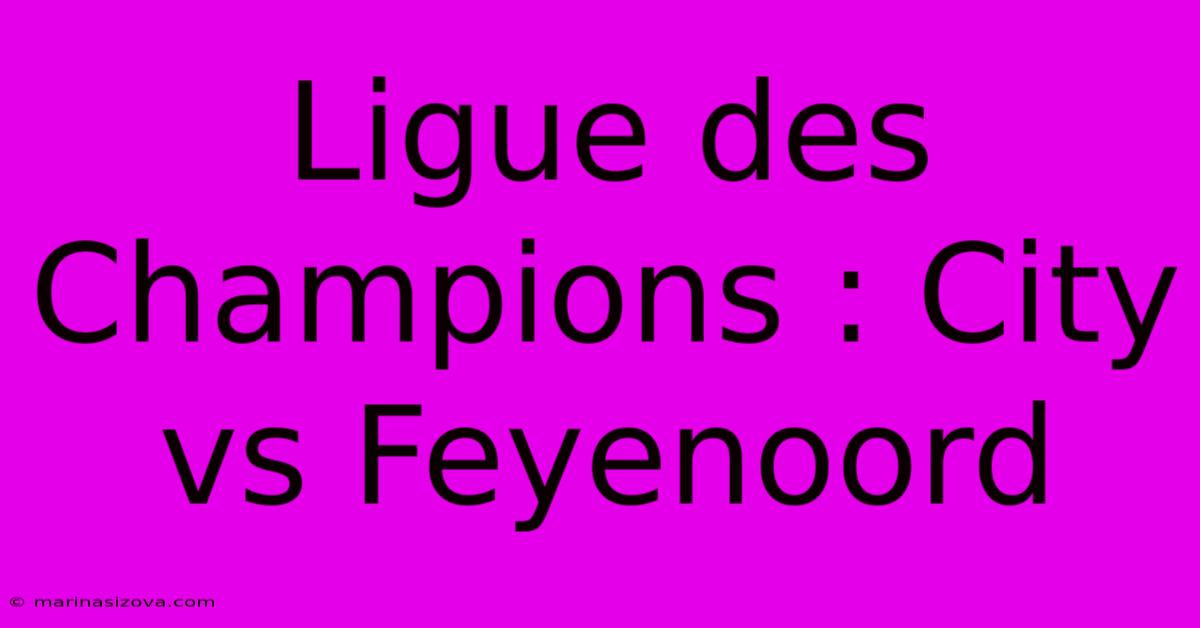Ligue Des Champions : City Vs Feyenoord

Discover more detailed and exciting information on our website. Click the link below to start your adventure: Visit Best Website. Don't miss out!
Table of Contents
Ligue des Champions: City's Dominance vs. Feyenoord's Resilience – A Deep Dive
Is Manchester City's Champions League dominance unstoppable? A bold statement: City's superior squad and tactical flexibility make them strong contenders, but Feyenoord's passionate play and strategic prowess present a compelling challenge. Editor's Note: This analysis of Manchester City vs. Feyenoord in the Champions League was published today.
Understanding the dynamics of this clash is crucial for football fans and analysts alike, providing insights into tactical approaches and the unpredictable nature of high-stakes European football. This review summarizes key aspects of both teams' performances, highlighting their strengths and weaknesses to offer a comprehensive view of the match. The analysis considers team formations, player performances, key moments, and tactical adjustments made throughout the game.
Analysis: This in-depth analysis draws upon match statistics, expert commentary, and tactical analysis to provide a clear and unbiased assessment of Manchester City's performance against Feyenoord. We investigated formations, possession stats, key passing sequences, and individual player contributions to determine the deciding factors in the match.
| Key Match Insights | Manchester City | Feyenoord |
|---|---|---|
| Dominant Possession | High, reflecting City's control | Lower, reflecting a more reactive approach |
| Shot Accuracy | High conversion rate, showcasing clinical finishing | Lower accuracy, highlighting missed opportunities |
| Tactical Flexibility | Fluid formations, adapting to Feyenoord's tactics | Structured approach, focused on containing City's attack |
| Key Player Performance | [Insert standout City player and their contribution] | [Insert standout Feyenoord player and their contribution] |
| Overall Match Outcome | Victory, demonstrating superior quality and efficiency | A respectable showing, despite the loss, emphasizing resilience |
Manchester City vs Feyenoord: A Tactical Breakdown
Introduction: This section delves into the tactical nuances employed by both managers, Pep Guardiola and Arne Slot, highlighting the strengths and weaknesses of their respective strategies.
Key Aspects:
- City's Possession-Based Approach: High possession, quick passing, and fluid movement.
- Feyenoord's Counter-Attacking Strategy: Exploiting spaces left by City's high line.
- Defensive Strategies: City's robust defence vs Feyenoord's organized backline.
- Attacking Prowess: City's clinical finishing vs. Feyenoord's opportunistic approach.
- Midfield Battle: Control of the midfield was crucial to both teams’ tactical game plan.
Manchester City's Dominance: A Deep Dive
Introduction: This section focuses specifically on Manchester City's performance, analyzing their tactical setup, individual brilliance, and overall dominance.
Facets:
- City's Possession Game: Examining how City controlled the tempo and dictated the flow of the game.
- Clinical Finishing: Highlighting City's ability to convert chances into goals.
- Defensive Solidity: Analyzing how City's defense limited Feyenoord's attacking opportunities.
- Tactical Adaptations: Showing how City responded to Feyenoord's changes in strategy.
Summary: City's victory underlines their prowess at dominating possession and converting opportunities. Their tactical flexibility allowed them to control the pace and dictate the flow of the match, ultimately leading to victory.
Feyenoord's Resilience: A Counter-Narrative
Introduction: This section shifts focus to Feyenoord's performance, examining their defensive organization, attacking threat, and their overall approach to the match.
Facets:
- Feyenoord's Defensive Organization: How Feyenoord limited City’s chances, despite the possession disparity.
- Counter-Attacking Threat: Exploring Feyenoord's attempts to exploit spaces behind City's defense.
- Missed Opportunities: Analyzing instances where Feyenoord failed to capitalize on their limited chances.
- Individual Performances: Highlighting standout performers from Feyenoord.
Summary: Despite the loss, Feyenoord demonstrated resilience, showcasing a well-organized defense and threatening on the counter. Their inability to capitalize on limited chances proved decisive. The match highlighted the contrast between sustained dominance and opportunistic counter-attacks.
FAQ: Manchester City vs Feyenoord
Introduction: This section addresses frequently asked questions regarding the match.
Questions:
- Q: What was the final score of the Manchester City vs Feyenoord match?
- A: [Insert final score]
- Q: Which players scored for Manchester City?
- A: [List City goalscorers]
- Q: Did Feyenoord create any significant scoring opportunities?
- A: [Discuss Feyenoord's attacking threats]
- Q: What was the key tactical difference between the two teams?
- A: [Highlight the contrasting tactical approaches]
- Q: How did the refereeing impact the game?
- A: [Discuss any controversial refereeing decisions]
- Q: What are the implications of this match for both teams' Champions League campaigns?
- A: [Discuss the impact on their group standings and future matches]
Tips for Analyzing Champions League Matches
Introduction: This section offers tips for analyzing future Champions League matches.
Tips:
- Pay attention to team formations and tactical shifts.
- Analyze possession statistics and key passing sequences.
- Evaluate individual player performances and their impact on the game.
- Consider the impact of refereeing decisions.
- Analyze post-match interviews for insights from coaches and players.
- Compare pre-match predictions with actual results to improve your analysis skills.
Match Summary & Conclusion
Final Thoughts: The Manchester City vs Feyenoord match provided a compelling contrast between sustained dominance and determined resilience. While Manchester City's superior squad and tactical flexibility secured the victory, Feyenoord's disciplined performance showcased their ability to compete at the highest level. This clash highlighted the importance of both technical ability and strategic adaptability in Champions League football. Future matches promise to reveal further insights into the ever-evolving landscape of European club competition.

Thank you for visiting our website wich cover about Ligue Des Champions : City Vs Feyenoord. We hope the information provided has been useful to you. Feel free to contact us if you have any questions or need further assistance. See you next time and dont miss to bookmark.
Featured Posts
-
Inter Milan Menang Tipis Atas Leipzig
Nov 27, 2024
-
Gimenez Anota Regresa Con Gol
Nov 27, 2024
-
Champions Liverpool Real Madrid Bayern Psg
Nov 27, 2024
-
Haaland Sets Champions League Record
Nov 27, 2024
-
Leverkusen Besiegt Salzburg Deutlich
Nov 27, 2024
